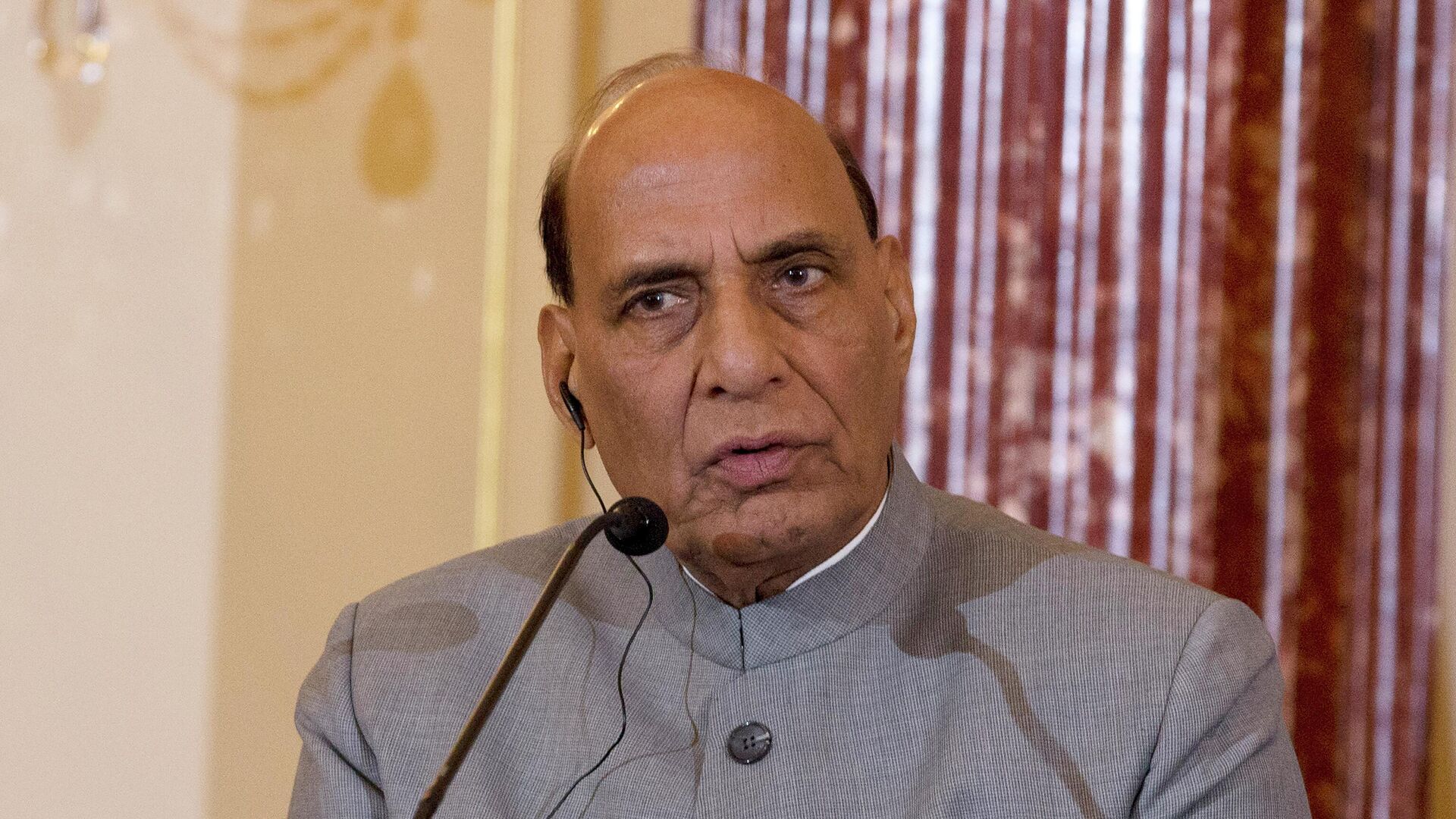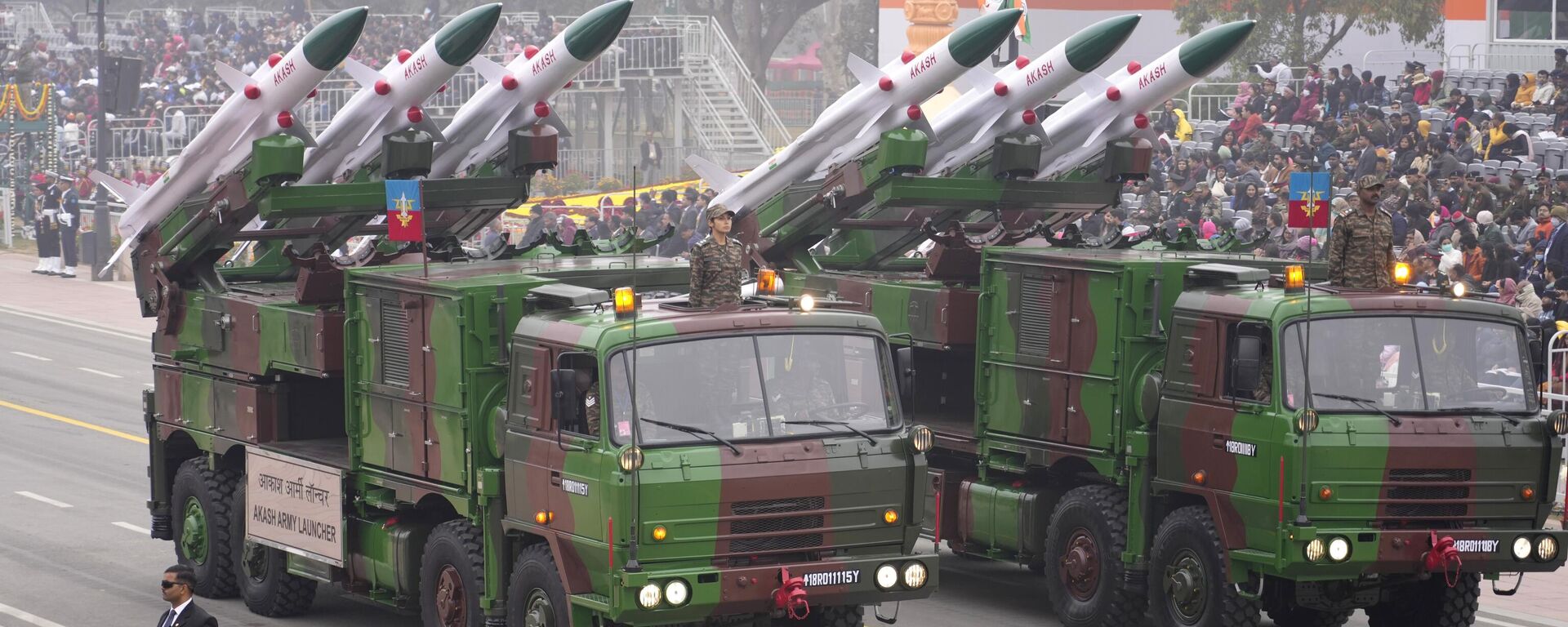https://sputniknews.in/20230515/india-wont-be-able-to-take-independent-global-stance-without-self-reliance-defence-minister-1976798.html
India Won’t Be Able to Take Independent Global Stance Without Self-Reliance: Defence Minister
India Won’t Be Able to Take Independent Global Stance Without Self-Reliance: Defence Minister
Sputnik India
Indian defense minister Rajnath Singh said on Monday that New Delhi wouldn’t be in a position to take an “independent” policy position on global issues unless it achieves “atmanirbharta” (self-reliance) in manufacturing
2023-05-15T19:16+0530
2023-05-15T19:16+0530
2023-05-15T19:16+0530
defenсe news
india
defense export
us
rajnath singh
make in india
self-reliant india
indigenization
indigenous production
https://cdn1.img.sputniknews.in/img/07e7/01/03/369331_0:0:3073:1728_1920x0_80_0_0_664fb3f2c9f8c013b2b86c26ee463f9b.jpg
Indian defence minister Rajnath Singh said on Monday that New Delhi wouldn’t be in a position to take an “independent” policy position on global issues unless it achieves “atmanirbharta” (self-reliance) in manufacturing, including in the key sector of defence.He further cautioned that New Delhi’s “import dependency” could become a “hindrance to strategic autonomy”.The defence minister also underlined that achieving self-reliance wasn’t akin to isolating oneself from the global market.India's 'Fourth Positive Indigenisation List'Singh noted that Prime Minister Narendra Modi’s government has taken a number of policy initiatives towards achieving self-reliance in defence manufacturing, including banning the imports of over 4,600 strategically-important defence spare parts, equipment and line replacement systems.The defence ministry on Sunday published the ‘Fourth Positive Indigenisation List’, which mandates the procurement of 928 defence items from domestic companies.The ministry said that the “import substitution” due to the fourth list would amount to over $86 million.How Much Does India Depend on Defence Exports?The first three “Positive Indigenisation Lists” published since 2020 which mandate the procurement of over 421 defence equipment as well as 3,000 components and sub-systems only through Indian companies.India has consistently been ranked as the biggest importer of defenceequipment globally, as per Swedish think tank Stockholm International Peace Research Institute (SIPRI).While Moscow still remains India’s largest source of weapons and defence systems, Russian arms exports to India declined by 53 percent between 2016 and 2020 compared with the previous five years.In recent years, several Russian companies have entered agreements with their Indian counterparts to set-up manufacturing facilities in India under the ‘Make in India’ policy.However, India’s defence import bill from the US has risen exponentially in the 2016-20 period, as it imported $3.4 billion worth of equipment.Several prominent US and other western companies have been averse to supplying New Delhi with technology to arms and equipment domestically.
https://sputniknews.in/20230401/new-delhis-defense-exports-hit-record-high-as-make-in-india-gains-momentum-1395102.html
india
us
Sputnik India
feedback.hindi@sputniknews.com
+74956456601
MIA „Rossiya Segodnya“
2023
Dhairya Maheshwari
https://cdn1.img.sputniknews.in/img/07e6/0c/13/138962_0:0:641:640_100x100_80_0_0_2cb44360dbcdf6d84bf4b299cd045917.jpg
Dhairya Maheshwari
https://cdn1.img.sputniknews.in/img/07e6/0c/13/138962_0:0:641:640_100x100_80_0_0_2cb44360dbcdf6d84bf4b299cd045917.jpg
News
en_IN
Sputnik India
feedback.hindi@sputniknews.com
+74956456601
MIA „Rossiya Segodnya“
Sputnik India
feedback.hindi@sputniknews.com
+74956456601
MIA „Rossiya Segodnya“
Dhairya Maheshwari
https://cdn1.img.sputniknews.in/img/07e6/0c/13/138962_0:0:641:640_100x100_80_0_0_2cb44360dbcdf6d84bf4b299cd045917.jpg
india defense imports, india us ties, india russia ties, india defence exports, atmanirbhar bharat, make in india, fourth positive indigenisation list
india defense imports, india us ties, india russia ties, india defence exports, atmanirbhar bharat, make in india, fourth positive indigenisation list
India Won’t Be Able to Take Independent Global Stance Without Self-Reliance: Defence Minister
India’s defence imports have declined by around 11 percent in the 2018-22 period vis-à-vis 2013-17, amid New Delhi’s push to reduce its defence imports bill by domestically manufacturing weapons, systems and spares.
Indian defence minister Rajnath Singh said on Monday that New Delhi wouldn’t be in a position to take an “independent” policy position on global issues unless it achieves “atmanirbharta” (self-reliance) in manufacturing, including in the key sector of defence.
“Without self-reliance, we cannot take independent decisions on global issues in line with our national interests. More equipment we import; more adverse impact it will have on our balance of trade. We are aiming to become a net exporter instead of a net importer. It will not only strengthen our economy, but increase employment opportunities,” Singh told the convocation ceremony of the Defence Institute of Advanced Technology (DIAT) in the western city of Pune.
He further cautioned that New Delhi’s “import dependency” could become a “hindrance to strategic autonomy”.
The defence minister also underlined that achieving self-reliance wasn’t akin to isolating oneself from the global market.
“It means catering to our own needs, while fulfilling the requirements of friendly countries,” he stated.
India's 'Fourth Positive Indigenisation List'
Singh noted that Prime Minister Narendra Modi’s government has taken a number of policy initiatives towards achieving self-reliance in defence manufacturing, including banning the imports of over 4,600 strategically-important defence spare parts, equipment and line replacement systems.
The defence ministry on Sunday published the ‘Fourth Positive Indigenisation List’, which mandates the procurement of 928 defence items from domestic companies.
The ministry said that the “import substitution” due to the fourth list would amount to over $86 million.
How Much Does India Depend on Defence Exports?
The first three “Positive Indigenisation Lists” published since 2020 which mandate the procurement of over 421 defence equipment as well as 3,000 components and sub-systems only through Indian companies.
India has consistently been ranked as the biggest importer of defenceequipment globally, as per Swedish think tank Stockholm International Peace Research Institute (SIPRI).
While Moscow still remains India’s largest source of weapons and defence systems, Russian arms exports to India declined by 53 percent between 2016 and 2020 compared with the previous five years.
In recent years, several Russian companies have entered agreements with their Indian counterparts to set-up manufacturing facilities in India under the ‘Make in India’ policy.
However, India’s defence import bill from the US has risen exponentially in the 2016-20 period, as it imported $3.4 billion worth of equipment.
Several prominent US and other western companies have been averse to supplying New Delhi with technology to arms and equipment domestically.



